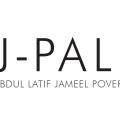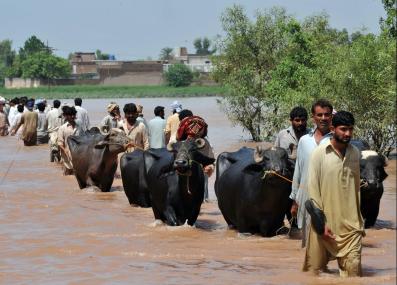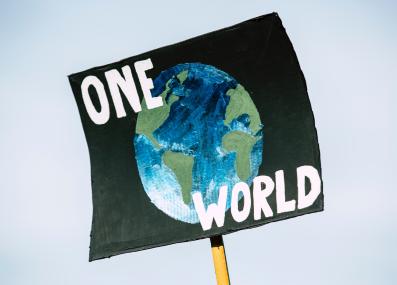Have a question?
Will climate change drive humans extinct or destroy civilization?
Almost certainly not—but unless we act quickly to stop warming the planet, there will be very severe consequences for many, many people.
October 20, 2023
First, the good news: climate scientists, as a whole, are not warning us to prepare for the apocalypse. The most recent report of the Intergovernmental Panel on Climate Change (IPCC)—a group of hundreds of scientists working with the United Nations to analyze climate change research from around the world—names many serious risks brought on by the warming of our planet, but human extinction is not among them.1
“If I had to rate odds, I would say the chances of climate change driving us to the point of human extinction are very low, if not zero,” says Adam Schlosser, the Deputy Director of the MIT Joint Program on the Science and Policy of Global Change and a climate scientist who studies future climate change and its impact on human societies.
In some ways, the most recent climate science even shows some encouraging trends. IPCC reports have always spelled out different scenarios for the amount of climate-altering greenhouse gases humans will put into the atmosphere, to show a range of possible climate risks the world may face. The IPCC calls these scenarios “representative concentration pathways” (RCPs), and they range from the relatively mild RCP2.6 scenario all the way up to RCP8.5, whose risks would be calamitous.
But as the world has made progress in recent years on switching to clean energy and controlling our greenhouse gas emissions, it has become clearer that we are not, in fact, headed toward the worst-case scenarios. “RCP8.5 is being viewed more and more as an extreme outcome,” says Schlosser. Even with no further progress on climate action, he says, the less-dire RCP6.0 scenario now looks closest to reality.
On the other hand, RCP6.0 would still be catastrophic to many people in many places. In fact, the latest IPCC report estimates that many climate risks are more serious than previously believed, even in the best case scenarios, based in part on the damage caused by the increased storms, heatwaves and droughts we’ve already seen.2
“Human extinction is not really the main worry,” says Schlosser. “There are going to be some really, really bad regional and local consequences. Consider island nations of the world—the type of warming that we're heading toward, with the expected sea level rise that could force them in many places to retreat or possibly abandon their homeland, is an existential threat to them.”
For many people, asking if climate change is the “end of the world” may be a way of asking if it’s the end of their world—if they should be taking steps to cope with widespread breakdowns in infrastructure or public services or the food supply. “And it depends upon where you live,” says Schlosser. “I would give a very different answer if you were living in the Northeast United States as opposed to an island nation or the coastal plains of Bangladesh or in the middle of the Sahel.”
In part, this is due to unequal climate impacts: low-lying coastal areas facing two or three feet of sea level rise will suffer greatly whether they’re wealthy Miami or impoverished Kiribati. But there is also a basic injustice at work. Wealthier countries and regions have the most resources to prepare for, soften and recover from climate impacts. This means they’re more able to bounce back after a disaster strikes.
“The most vulnerable populations are the poorest populations,” says Schlosser. “If we do nothing about climate change, conditions are going to get worse for people who are poor and don't have the means to cope with it.”
Over the past hundred years, the world has made enormous progress in reducing extreme poverty.3 But climate change threatens to halt or reverse those gains in many regions, says Schlosser, by reducing crop yields and forcing low-income countries to channel ever more of their limited wealth into withstanding extreme weather. “They're going to spend more and more of their resources to adapt to an ever-changing climate. And those resources that they could have used for recreation, welfare, livelihoods, won't be there.”
To rob these people—who have done the least to contribute to climate change—of rising standards of living would be a mass tragedy, made no less painful by the fact that human civilization would carry on in some form.
“If I had to rank climate change as an existential risk to humanity, it would be below a lot of the other threats that are heavy on people's minds,” says Schlosser. “Nuclear war, global pandemics: as an existential risk these are far greater than climate change.”
“But I understand why people are using that language,” he adds, “because they want people to pay attention. The worry is that it is a little distorted. I would find it a tragedy, personally, if we had to show that human existence would be wiped away for us to do anything about human-caused climate change. This is about recognizing that there is a massive disruption coming to our way of life, and a potentially existential disruption to the way of life of many people around the world who have very little control over future climate change.”
Thank you to Daniel Mercier of Honolulu, Hawaii, for the question. You can submit your own question to Ask MIT Climate here.
1 Intergovernmental Panel on Climate Change, "Climate Change 2023: Synthesis Report." Contribution of Working Groups I, II and III to the Sixth Assessment Report of the Intergovernmental Panel on Climate Change, H. Lee and J. Romero eds. 2023. doi:10.59327/IPCC/AR6-9789291691647.
2 Intergovernmental Panel on Climate Change, "Climate Change 2023: Synthesis Report," 3.1.2 Impacts and Related Risks. Contribution of Working Groups I, II and III to the Sixth Assessment Report of the Intergovernmental Panel on Climate Change, H. Lee and J. Romero eds. 2023. doi:10.59327/IPCC/AR6-9789291691647.
3 Moatsos, M., "Global extreme poverty: Present and past since 1820", in How Was Life? Volume II: New Perspectives on Well-being and Global Inequality since 1820, 2021, OECD Publishing, Paris, doi:10.1787/e20f2f1a-en.









